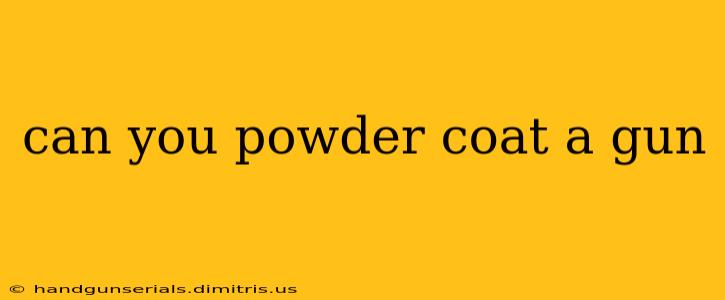Can You Powder Coat a Gun? A Comprehensive Guide to Firearms Finishing
Powder coating is a popular finishing method for various metal objects, offering durability and a wide array of colors. But when it comes to firearms, the question of whether or not you can powder coat a gun is more nuanced than a simple yes or no. The answer depends heavily on several factors, including legal considerations, safety precautions, and the specific firearm itself.
Legal Ramifications: Navigating the Regulatory Landscape
Before even considering the practical aspects of powder coating a firearm, it's crucial to understand the legal implications. Regulations regarding firearm modifications vary significantly by location. In some jurisdictions, altering a firearm's finish might be permissible, while in others, it could be considered illegal modification, potentially leading to penalties.
Always check your local and federal laws before attempting to powder coat any firearm. This includes researching regulations related to:
- Serial numbers: Altering or obscuring a firearm's serial number is almost universally illegal.
- Licensed gunsmiths: Some jurisdictions may require licensed gunsmiths to perform any modifications to firearms.
- Specific firearm types: Certain types of firearms may be subject to stricter regulations regarding modifications.
Ignoring these legal requirements could result in serious consequences. It's better to be safe than sorry; consult with legal professionals or local law enforcement to ensure compliance before proceeding.
Safety First: Essential Precautions for Powder Coating Firearms
Even if powder coating your firearm is legal in your area, safety remains paramount. Powder coating involves working with potentially hazardous materials and equipment. Improper handling can lead to injury or damage to the firearm.
Critical safety measures include:
- Proper ventilation: Powder coating releases fumes; ensure adequate ventilation in your workspace to prevent inhaling harmful particles. A respirator is highly recommended.
- Eye protection: Always wear appropriate eye protection to shield against powder particles and potential splashes.
- Fire safety: Be mindful of fire hazards associated with the powder coating process, especially when working with high temperatures. Keep a fire extinguisher nearby.
- Grounding: Proper grounding of the firearm and equipment is vital to prevent static electricity buildup, which can cause sparking and ignition.
- Temperature control: Overheating the firearm during the powder coating process can damage its internal components. Follow the manufacturer's instructions for the powder coating oven carefully.
Practical Considerations: The Challenges of Powder Coating Firearms
While technically feasible, powder coating a firearm presents unique challenges compared to other metal objects:
- Heat sensitivity: Firearms contain sensitive internal parts that can be damaged by excessive heat. The powder coating process requires high temperatures, demanding precise control to avoid harming the firearm's functionality.
- Moving parts: Proper masking of moving parts is essential to ensure they function correctly after powder coating. Improper masking can lead to malfunctions.
- Finish durability: The harsh conditions firearms are subjected to (recoil, moisture, etc.) require a powder coat that is exceptionally durable and resistant to wear and tear. Choosing the right type of powder coat is essential.
- Potential for malfunction: Improperly applied powder coating could lead to malfunctions. This is a serious concern with firearms, where malfunction can lead to injury.
Conclusion: Weighing the Risks and Rewards
Powder coating a firearm is possible, but it's not a task to be undertaken lightly. Thorough research, meticulous preparation, and adherence to safety regulations are absolutely crucial. Consider the legal implications in your area, and carefully evaluate the risks before attempting this process. If you're unsure about any aspect, consulting a qualified and experienced gunsmith is highly recommended. Remember, the safety and functionality of your firearm should always be your top priority.

